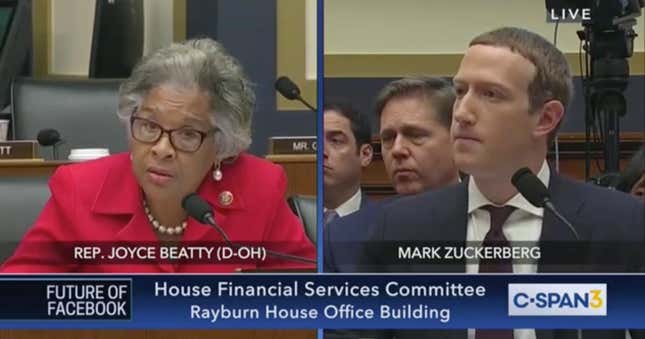
To hear Congresswoman Joyce Beatty tell it, this wasn’t the first time she took the founder and CEO of Facebook to task for his dismal record on civil rights—but after her tense, blistering exchange with Mark Zuckerberg on Capitol Hill Wednesday, he’d better hope it’s the last time.
The Ohio Democrat called Zuckerberg out on “ruining” the lives of black Americans, questioned his stated commitment to diversity, and pressed him on a recent civil rights audit Facebook underwent. Through the heated two-minute exchange, Zuckerberg looked inept, wilting like grilled squash under a buffet heat lamp.
Beatty began by questioning whether any of Facebook’s cash was managed by minority-owned firms. When Zuckerberg struggled to answer, Beatty interrupted: “I’ll take that as a no.” She then asked him if any “diverse-owned or women-owned law firms” were contracted by Facebook. Again, Zuckerberg couldn’t answer.
She then asked Zuckerberg if he did the reading before coming to Congress and wasting everyone’s time. Literally: “Did you review the packet that went out in notification to you and your team about what was included today? And diverse asset management was in it. Did you read that?” she asked. She noted that the packet included a piece of legislation she had been working on; she was curious if Zuckerberg or his team had read it.
Zuckerberg apparently had not.
“Everyone’s talked about your scholarly resume, did you review the packet that was sent to you from this committee?” she asked.
(At this point, you may want to get a sip of water, because TRUST: it doesn’t get any less hot from here.)
Beatty was unsparing when she questioned Zuckerberg about an ongoing civil rights audit aimed at assessing the company’s policies and operations. As the Washington Post notes, the audit has been touted by Facebook as a “signal of its commitment to diversity” as it struggles to combat allegations that the platform disproportionately punishes and targets minority groups. But Zuckerberg struggled to name the recommendations the audit had made thus far, nor could he name the civil rights law firm—Relman, Dane and Colfax—conducting it.
“It’s almost like you think this is a joke,” Beatty told Zuckerberg. “When you have ruined the lives of many people, discriminated against them.”
She also slammed his “civil rights work,” noting that it was “a result of the number of lawsuits that you’ve had.” Beatty then went on to point out that if Facebook had “real diversity of inclusion,” someone may have been able to point out the company’s issue with its advertising tools. Earlier this year, the Department of Housing and Urban Development (yes, Ben Carson’s shop) filed a suit against the company alleging that its advertising tools violated the Fair Housing Act by enabling housing discrimination. Beatty referred to the violation as digital “redlining”—“using zip codes to eliminate people from getting information.”
There is a certain amount of schadenfreude watching a billionaire like Zuckerberg get exposed. He was visibly frustrated, flustered, and out of his depth as he struggled to cobble together answers to Beatty’s questions. But while it’s certainly amusing to see the 1 percent of the 1 percent wilt under the pressure of intense—and overdue—accountability (New York Congresswoman Alexandria Ocasio-Cortez had a similar, if only slightly less heated, grilling of the Facebook founder), it’s important to remember that Zuckerberg isn’t some hapless computer engineering major taking a required art history elective: he’s arguably the most powerful person on the planet. This is not strictly because of his sizable net worth (at $69 billion, he’s the 8th richest person on the planet). Through Facebook, which has over 1 billion users, Zuckerberg oversees the data of approximately 1 billion people (or, nearly 1/8 of the total global population).
If he were merely incompetent, that would be one thing. But Facebook’s issues with privacy violations, coupled with a long track record of over-policing black Facebook users and a general reluctance to protect them in the face of disinformation campaigns that disproportionately target the black community, point to something far worse. It’s malfeasance. And it’s important to note: he won’t fix it by simply hiring a black exec willing to be the face of his harmful policies.
“Do you know what percentage of African Americans are on Facebook in comparison to majority folks?” Beatty asked Zuckerberg at one point.
Zuckerberg responded that he did not know because Facebook “[doesn’t] collect the races of people.”
“Well it came out in a report and in the Pew Research Center that was sent to you,” Beatty snapped. “So maybe you just don’t read a lot of things that deal with civil rights or African Americans.”

